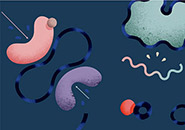Science Education Priority
Preparing students for 21st-century challenges in science and technology requires 21st-century thinking in the classroom.
Science courses should allow students to emerge with critical thinking skills, creative problem-solving, and an ability to synthesize information across disciplines. Yet most undergraduate science coursework remains tied to the textbook, valuing knowledge over competency.
Scientists must work across disciplinary boundaries, but the courses offered by many universities have been the same for decades, with few opportunities to connect biology, chemistry, math, and physics.

How can we engage students and prepare them for successful careers in science and medicine?
In 2011 HHMI launched a new science education experiment that brought together four universities to create and share models for teaching interdisciplinary science, including new courses and ways of assessing how well they work. The four-year, $1.8 million National Experiment in Undergraduate Science Education, or NEXUS, involves Purdue University; the University of Maryland, Baltimore County (UMBC); the University of Maryland, College Park, and the University of Miami. They are creating curricula that connect biology with physics, math, and chemistry. The schools are also working on how to move beyond testing students’ knowledge of facts to assessing their ability to demonstrate scientific competencies, such as applying knowledge to analyze a problem.
The groundwork for what became the NEXUS project began in 2009. HHMI asked research universities to suggest experiments in science education, and a common theme emerged. Several schools said they wanted to address issues raised in a 2009 report that examined the scientific competencies needed by medical students.
That report, called Scientific Foundations for Future Physicians, was developed by a committee of scientists, physicians, and science educators convened by the Association of American Medical Colleges and HHMI. It recommended fundamental changes in undergraduate education and outlined eight interdisciplinary competencies that science undergraduate students should master before they go on to medical school. For example, instead of requiring specific physics courses, premedical students would be expected to “demonstrate knowledge of basic physical principles and their application to the understanding of living systems.” They could learn that the traditional way, in physics courses, or in a new generation of interdisciplinary classes. These recommendations make sense for other science students, as well.
Through its undergraduate grants program, HHMI encourages competency-based curriculum development by supporting programs that recruit new faculty who will teach in interdisciplinary areas; create inquiry-based learning opportunities; and implement the recommendations outlined in the Scientific Foundations for Future Physicians report.
They did it:
- Oberlin College is establishing a center for quantitative skills that will help natural science students strengthen their understanding of quantitative and formal reasoning skills. The center will provide peer support for basics such as math and graphs, and advanced skills, such as modeling, which are common among different disciplines.
- Luther College completed a $30-million expansion and renovation of its science facilities, which are designed to encourage and promote student-faculty interaction both within and outside the classroom and laboratory. A grant from HHMI is enhancing those interactions between the science and education disciplines.
- Purdue University is revising the introductory chemistry curriculum to include more biological chemistry with a focus on active learning approaches.
- The University of Maryland, Baltimore County is infusing mathematical modeling into its introductory biology course, including quantitative reasoning skills and mathematical approaches to understand biological processes and living systems.
- The University of Maryland, College Park is revising its introductory physics course for biology majors to present physics concepts in a biological context.
- The University of Miami is developing biomedical case studies that will challenge students to use scientific inquiry to analyze the biology, physics, chemistry, and math involved in human health and disease.
Read more about it
AT HHMI:
- "New Foundations for Future Physicians," HHMI Annual Report, 2009
- HHMI News: Collaboration Seeks to Create Interdisciplinary Undergraduate Curriculum, June 8, 2011
AND BEYOND:



